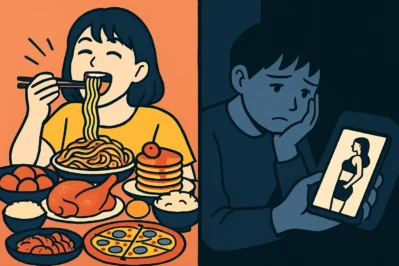Beyond the Mukbang: A Serious Talk About Eating Disorders in Korean
Hello! It’s your favorite Korean language guide, Maeil Hangeul, here to upgrade your skills!
Today, we’re diving into a more serious but incredibly important topic: how to discuss social issues in Korean, specifically focusing on eating disorders. You might wonder why this is important. Well, lately in Korea, there’s a huge boom in social media trends like “mukbang” (eating shows) and “body profile” (바디 프로필) photoshoots. This has sparked a lot of conversation about body image and health, making this a very relevant and timely topic. Being able to discuss this thoughtfully will not only improve your Korean but also deepen your understanding of modern Korean society.
Let’s get started!
Core Expressions You Need to Know
Here are some key phrases to help you navigate this important conversation.
1. 섭식 장애 (Seopsik Jang-ae)
* Pronunciation [Romanized]: Seop-sik Jang-ae
* English Meaning: Eating Disorder
* Detailed Explanation: This is the formal, medical term. ‘섭식’ (seopsik) comes from Hanja characters meaning ‘to ingest food,’ and ‘장애’ (jang-ae) means ‘disorder’ or ‘disability.’ It’s a neutral and respectful term to use in any conversation, whether with friends or in a more formal setting.
2. 인식을 개선하다 (Insig-eul Gaeseonhada)
* Pronunciation [Romanized]: In-sig-eul Gae-seon-ha-da
* English Meaning: To improve awareness / To improve perception
* Detailed Explanation: This is a fantastic phrase for any social issue! ‘인식’ (insik) means ‘awareness’ or ‘perception,’ and ‘개선하다’ (gaeseonhada) means ‘to improve’ or ‘to make better.’ You can use it to say things like, “We need to improve awareness about eating disorders.” (우리는 섭식 장애에 대한 인식을 개선해야 해요.)
3. 몸매 강박 (Mommae Gangbak)
* Pronunciation [Romanized]: Mom-mae Gang-bak
* English Meaning: Body shape obsession / compulsion
* Detailed Explanation: This is a very common term in modern Korean conversations about beauty standards. ‘몸매’ (mommae) means ‘body shape,’ and ‘강박’ (gangbak) means ‘obsession’ or ‘compulsion.’ It perfectly describes the intense social pressure to have a certain type of body, often fueled by social media. It’s a slightly informal but widely understood term.
4. …에 대한 편견을 없애다 (…e daehan Pyeongyeon-eul Eopsaeda)
* Pronunciation [Romanized]: …e dae-han Pyeon-gyeon-eul Eop-sae-da
* English Meaning: To get rid of prejudice against…
* Detailed Explanation: A powerful phrase for advocating change. ‘편견’ (pyeongyeon) means ‘prejudice’ or ‘bias,’ and ‘없애다’ (eopsaeda) means ‘to get rid of’ or ‘to eliminate.’ You can place any noun before ‘에 대한’ to talk about eliminating prejudice. For example: “정신 건강 문제에 대한 편견을 없애야 해요.” (We need to get rid of the prejudice against mental health issues.)
Example Dialogue
Let’s see how these expressions work in a real conversation between two friends, Minjun (A) and Sora (B).
A (민준): 소라야, 요즘 SNS에서 ‘바디 프로필’ 챌린지가 유행이잖아. 근데 이게 섭식 장애 문제랑 관련이 깊다는 기사를 봤어.
Sora, you know the ‘body profile’ challenge is trending on social media, right? I just read an article saying it’s deeply connected to the problem of eating disorders.
B (소라): 맞아, 나도 봤어. 건강한 목표도 좋지만, 너무 심한 몸매 강박으로 이어지는 것 같아 걱정돼.
Right, I saw that too. Having a healthy goal is good, but I’m worried it’s leading to a severe obsession with body shape.
A (민준): 내 말이. 아직도 이걸 그냥 ‘의지가 약해서’ 생기는 문제라고 생각하는 사람들이 많더라. 사회적인 인식을 개선하는 게 정말 시급해.
Exactly. So many people still think it’s just a problem of ‘weak willpower.’ It’s urgent that we improve social awareness.
B (소라): 응, 그리고 섭식 장애에 대한 편견을 없애는 노력도 필요하고. 혼자 힘들어하는 사람들이 많을 거야.
Yes, and we also need efforts to get rid of the prejudice against eating disorders. There must be so many people struggling alone.
Culture Tip & Trend Deep Dive
The ‘Mukbang’ and ‘Body Profile’ Paradox
Here’s a fascinating aspect of modern Korean culture. On one hand, ‘먹방’ (mukbang), or eating shows, are incredibly popular. It’s a culture that celebrates food. On the other hand, the “바디 프로필” (often shortened to “바프”) trend, where people undergo extreme diets and exercise to take professional-level fitness photos, has exploded.
Korean Z-generations on Instagram and YouTube openly discuss this paradox. They talk about the immense ‘몸매 강박’ that comes from seeing perfectly sculpted bodies online. When you discuss this topic, mentioning the contradictory nature of ‘먹방’ and ‘바프’ culture will show that you have a nuanced understanding of what’s happening in Korea right now. Saying something like, “한국에는 먹방 문화와 바디 프로필 문화가 공존하는 게 흥미로워요” (It’s interesting that mukbang culture and body profile culture coexist in Korea) will make you sound like a true insider!
Let’s Review and Practice!
Great job today! We learned how to discuss the important topic of eating disorders with sensitivity and depth. We covered 섭식 장애 (eating disorder), 인식을 개선하다 (to improve awareness), 몸매 강박 (body shape obsession), and 편견을 없애다 (to get rid of prejudice).
Now, let’s put your knowledge to the test!
- Fill in the blank:
SNS는 때때로 젊은 사람들에게 ______ ______을/를 줄 수 있습니다.
(Social media can sometimes give young people a ______ ______.)
Answer: 몸매 강박 (mommae gangbak) -
Make a sentence:
Using the grammar...에 대한 인식을 개선하다, write a short sentence about a topic you care about. (e.g., a sentence about improving awareness of environmental issues).
Now it’s your turn! Try answering the practice questions or share your thoughts on today’s topic in the comments using the expressions we learned. I can’t wait to read them






